
The East Asian Games was a multi-sport event organized by the East Asian Games Association (EAGA) and held every four years from 1993 to 2013. Among those who competed included athletes from East Asian countries and territories of the Olympic Council of Asia (OCA), as well as the Pacific island nation of Guam, which is a member of the Oceania National Olympic Committees.

The 1959 Southeast Asian Peninsular Games, officially known as the 1st Southeast Asian Peninsular Games, was the first and inaugural edition of the biennial multi-sport event for Southeast Asian athletes, organised by the SEAP Games Federation. It was held in Bangkok, Thailand from 12 to 17 December 1959 with 12 sports featured in the games. Cambodia, one of the six founding members of the SEAP Games Federation, did not compete at the inaugural edition. For the first time and first among all Southeast Asian nations, Thailand hosted the Southeast Asian Peninsular Games, which later known as the Southeast Asian Games. The games was opened and closed by Bhumibol Adulyadej, the King of Thailand at the Suphachalasai Stadium. The final medal tally was led by host Thailand, followed by its neighbouring countries, Burma and Malaya.

The 1961 Southeast Asian Peninsular Games, officially known as the 2nd Southeast Asian Peninsular Games, was a Southeast Asian multi-sport event held in Rangoon, Burma from 11 to 16 December 1961 with 13 sports featured in the games. This was the first time all six founding members of the SEAP Games Federation competed in the biennial sports festival and the first time Myanmar, then known as Burma hosted the games. Burma, later known as Myanmar is the second country to host the Southeast Asian Peninsular Games, which later known as the Southeast Asian Games after Thailand. The games was opened and closed by Win Maung, the President of Burma at the Bogyoke Aung San Stadium. The final medal tally was led by host Burma, followed by Thailand and Malaya.
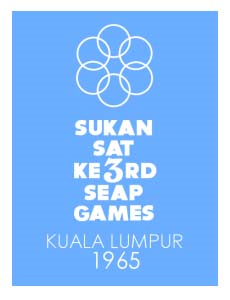
The 1965 Southeast Asian Peninsular Games, officially known as the 3rd Southeast Asian Peninsular Games, was a Southeast Asian multi-sport event held in Kuala Lumpur, Malaysia, from 14 to 21 December 1965 with 14 sports featured in the games. Originally to be hosted by Laos, the third edition of the games was hosted by Malaysia after the former was not able to honour its hosting commitment citing financial difficulties and would later known to have hosted the 2009 SEA Games decades later. Two years earlier, the third SEAP Games was cancelled as Cambodia pulled out of hosting the event due to internal strife. This was the first time Malaysia host the games. Malaysia is the third country to host the Southeast Asian Peninsular Games, which later known as the Southeast Asian Games after Thailand and Myanmar, then Burma. The games was opened and closed by Ismail Nasiruddin, the King of Malaysia at the Stadium Merdeka. The final medal tally was led by Thailand followed by host Malaysia and Singapore.

The 1967 Southeast Asian Peninsular Games, officially known as the 4th Southeast Asian Peninsular Games, was a Southeast Asian multi-sport event held in Bangkok, Thailand from 9 to 16 December 1967 with 16 sports featured in the games. Cambodia once again declined to host this edition of the games, as it did in 1963. This was Thailand's second time hosting the Southeast Asian Games, and its first time since the 1959 inaugural games. The games was opened and closed by Bhumibol Adulyadej, the King of Thailand at the Suphachalasai Stadium. The final medal tally was led by host Thailand, followed by Singapore and Malaysia.

The 1969 Southeast Asian Peninsular Games, officially known as the 5th Southeast Asian Peninsular Games, was a Southeast Asian multi-sport event held in Rangoon, Burma from 6 to 13 December 1969 with 15 sports featured in the games. Republic of Vietnam had reluctantly declined to host this edition because the attack of the North Vietnam in 1968. Singapore, the youngest member of the SEAP Games Federation at the time, suggested in this edition of the games to change the name of the sports festival to the Southeast Asia Games. Although it was not officially stated, the inclusion of the Philippines and Indonesia in the expanded federation was to greatly help alleviate the hosting problems, as well as to set higher and more competitive standards in the games. After hosting the 5th edition, Burma declined hosting succeeding games due to lack of financial capability. This was Burma's second time to host the games and its first time since 1961. The games was opened and closed by Ne Win, the Prime Minister and Chairman of Union Revolutionary Council of Burma at the Bogyoke Aung San Stadium. The final medal tally was led by host Burma, followed by Thailand and Singapore.
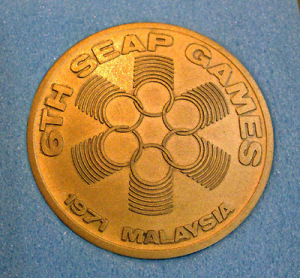
The 1971 Southeast Asian Peninsular Games, officially known as the 6th Southeast Asian Peninsular Games, was a Southeast Asian multi-sport event held in Kuala Lumpur, Malaysia from 6 to 13 December 1971 with 15 sports featured in the games. In this edition of the games, host country Malaysia joined Singapore in pressuring Thailand to let the SEAP Games Federation expand to include the Philippines and Indonesia, but to no avail. Thai officials felt that such expansion would be contrary to the small family affair they had intended the games to be, and would not be in keeping with the close-neighbours spirit the games was supposed to cultivate. This was the second time Malaysia hosted the games and its first time since 1965. The games was opened and closed by Abdul Halim, the King of Malaysia at the Stadium Merdeka. The final medal tally was led by Thailand, followed by host Malaysia and Singapore.

The 1973 Southeast Asian Peninsular Games, officially known as the 7th Southeast Asian Peninsular Games, was a Southeast Asian multi-sport event held in Singapore from 1 to 8 September 1973 with 16 sports featured in the games. This was the first time Singapore hosted the games. Singapore is the fourth nation to host the Southeast Asian Games after Thailand, Burma and Malaysia. The games was opened and closed by Benjamin Sheares, the President of Singapore at the Singapore National Stadium. The final medal tally was led by Thailand, followed by host Singapore and Malaysia.
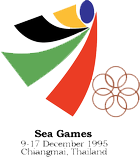
The 1995 Southeast Asian Games, officially known as the 18th Southeast Asian Games, Chiang Mai, 1995, was a Southeast Asian multi-sport event held in Chiang Mai, Thailand from 9 to 17 December 1995. It was the first time that a non-capital city hosted the biennial sports event. Chiang Mai is the second Thai city to host the Southeast Asian Games after Bangkok. The games were opened and closed by Vajiralongkorn, the then-Crown Prince of Thailand. With the return of Cambodia, all ten members of the federation were present to compete in the SEA Games for the first time.
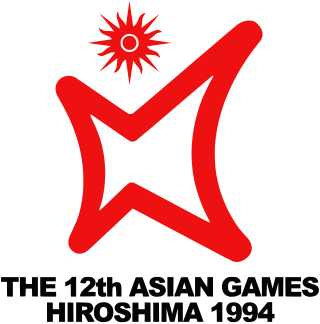
The 1994 Asian Games, also known as the XII Asiad and the 12th Asian Games or simply Hiroshima 1994, were held from October 2 to 16, 1994, in Hiroshima, Japan.This is first on Games'history that a country non-capital city hosted the event.The main theme of this edition was to promote peace and harmony among Asian nations. This concept was used due the historical fact that the city was the site of the first atomic bomb attack 49 years earlier. Due to the 1991 Gulf War, Iraq was suspended from the games. The games debuted the five Asian former republics of the Soviet Union: Kazakhstan, Kyrgyzstan, Tajikistan, Turkmenistan, and Uzbekistan.
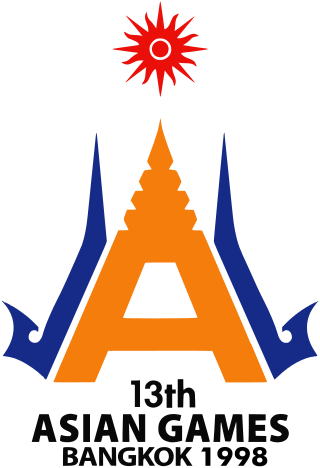
The 1998 Asian Games, officially known as the 13th Asian Games and the XIII Asiad,, or simply Bangkok 1998, was an Asian multi-sport event celebrated in Bangkok, Thailand from December 6 to 20, 1998, with 377 events in 36 sports and disciplines participated by 6,554 athletes across the continent. The sporting events commenced on 30 November 1998, a week earlier than the opening ceremony.
The South Asian Games, formerly known as the South Asian Federation Games, is a quadrennial multi-sport event held among the athletes from South Asia. The governing body of these games is South Asia Olympic Council (SAOC), formed in 1983. Currently, the SAOC comprises 7 member countries, namely Bangladesh, Bhutan, India, Maldives, Nepal, Pakistan, and Sri Lanka. Afghanistan participated 4 times in the SAF Games since 2004, but left the SAOC after participating in the 2016 edition and joined CAOC.

The 1991 South Asian Games were held in Colombo, Sri Lanka from 22 December to 31 December 1991.

Anand Amritraj is an Indian former tennis player and businessman. He, along with brother Vijay Amritraj, led India into the 1974 Davis Cup finals against South Africa, and was a part of the Indian team captained by Vijay Amritraj which reached the final of the Davis Cup in 1987 against Sweden.

The National Games of India consist of various disciplines in which athletes from the different states of India participate against each other. The country's first few Olympic Games, now renamed as National Games, were held in North India (Delhi, Allahabad, Patiala, Madras, Calcutta and Bombay.

The 2016 South Asian Games, officially the XII South Asian Games, is a major multi-sport event which took place from 5 February to 16 February 2016 in Guwahati and Shillong, India. A total of 2,672 athletes competed in 226 events over 22 sports. Indian Prime Minister Narendra Modi inaugurated the 2016 South Asian Games in Guwahati on 5 February 2016. India continued its dominance in the game's medal tally with a staggering 308 medals including 188 gold medals.
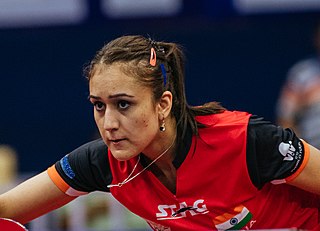
Manika Batra is an Indian table tennis player. She was the top female singles table tennis player in India and currently is ranked second in India. She is currently ranked 28 in the world by ITTF as of July 2024. She is one of the female players who uses a long pimple rubber. She was awarded the Major Dhyan Chand Khel Ratna in 2020.
Men's football took place at the 1995 South Asian Games. India won their third title by defeating Bangladesh in the final by 1–0.

Results of India national football team from 1990–1999.
Maldives has participated all 13 editions of South Asian Games governed by South Asia Olympic Council. Maldives never hosted a single South Asian Games so far. At 13th South Asian Games, Maldives claimed its first ever gold. With that achievement Maldives became the last country to win a gold medal at the South Asian Games.

















